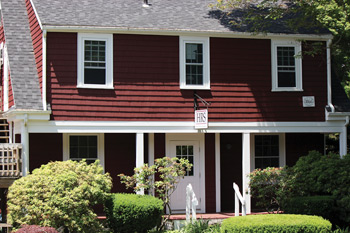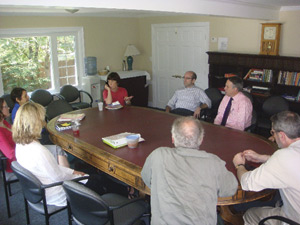Human Relations Service – Our Communities’ Keeper
Liz Suneby writer
Beth Nast photographer
 In two antique homes nestled behind the Wellesley Hills Congregational Church and next door to “America the Beautiful” songwriter Katharine Lee Bates’ former home resides a private, non-profit mental health provider that is anything but quaint. Human Relations Service (HRS) is a pioneering mental health counseling service, the first in the United States to adopt the mental health of a community as its mission and to emphasize prevention in its programs. More than 60 years after its beginning, the agency’s goals remain steadfast — to support the well-being of the people who live in Weston, Wellesley, and Wayland and to prevent and treat mental illness by assisting people through tough situations and transitions in their lives.
In two antique homes nestled behind the Wellesley Hills Congregational Church and next door to “America the Beautiful” songwriter Katharine Lee Bates’ former home resides a private, non-profit mental health provider that is anything but quaint. Human Relations Service (HRS) is a pioneering mental health counseling service, the first in the United States to adopt the mental health of a community as its mission and to emphasize prevention in its programs. More than 60 years after its beginning, the agency’s goals remain steadfast — to support the well-being of the people who live in Weston, Wellesley, and Wayland and to prevent and treat mental illness by assisting people through tough situations and transitions in their lives.
HRS was founded in 1948 by a group of Wellesley residents and the chief of psychiatry at the Massachusetts General Hospital, Erich Lindemann, a German refugee known for his ground-breaking research in the areas of grief and crisis intervention. The Wellesley residents approached Dr. Lindemann to create a “mental hygiene” program that would address behavioral concerns among the town’s youth. Ahead of his time, Lindemann seized the opportunity to study a long-held tenet: that mental health prevention techniques could help individuals, especially children, to cope with events as profound as a death in the family or as commonplace as moving to a new home. Dr. Lindemann’s seminal work with children in the grant-funded project known as “The Wellesley Human Relations Service” showed that intervention before predictable occurrences, such as starting school, can safeguard against serious emotional problems later on.
An equally important cornerstone of Lindemann’s work which endures is the importance of community involvement in establishing and maintaining wellness. Stress and suffering can be reduced by strengthening the natural bonds of family and community and the coping skills of caregivers — such as pediatricians, clergy, teachers — rather than waiting until problems require treatment. Long before any bumper sticker or book jacket bore the saying, “It takes a village,” Dr. Lindemann was recruiting members of Wellesley’s clergy, police force, town government, and other institutions to help realize HRS’s mission.

HRS Executive Director Rob Evans in his office
Today, as the principal provider of outpatient mental health services to families and children in Weston, Wellesley, and Wayland, HRS’s staff of about 30 professionals deliver 6,000 hours of treatment per year to more than 400 individuals from nearly 200 families. Residents whose HRS visits are not covered by health insurance are eligible for sliding scale fees for child, adult, and family therapy. Up to 30 percent of HRS clients each year require this fee reduction. Since its founding in 1948, HRS has never denied treatment to any resident unable to pay.
Jeane Whitehouse is a staff psychologist at HRS who helps match people to the right HRS resource. She notes that, over the years, people have turned to HRS for the following reasons: “Parents struggling with children who are disobedient or shy or sad or anxious, and with teenagers who are having trouble with impulse control — drugs, alcohol, or lots of difficulty doing schoolwork; couples struggling with creating a good marriage which is satisfying to both partners; and children and adults with serious mental illness where the family is searching for help and change.” Jeane also notes that, recently, HRS has been receiving more calls from households where one or both parents are out of work and need help coping with the stresses that the economic downturn creates.
 In addition to working with children and families, HRS provides Employee Assistance Programs (EAP) for Town of Wellesley employees — police, firemen, teachers, and administrative staff — and crisis intervention and community education to an array of secular and religious groups in Wellesley, Weston, and Wayland. The agency works closely with the elementary, middle, and high schools in the towns, consulting with teachers and administrators about how to help students. Former HRS Chief Psychiatrist Arnold Kerzner, who retired in June 2011 after 41 years at the agency, applauds HRS’s holistic approach: strengthening connections to nurture mental health. “HRS takes the time to get familiar with the child and the family, and reaches out into the schools and other community supports to provide a ‘wrap around’ therapy for every family we see,” Kerzner explains.
In addition to working with children and families, HRS provides Employee Assistance Programs (EAP) for Town of Wellesley employees — police, firemen, teachers, and administrative staff — and crisis intervention and community education to an array of secular and religious groups in Wellesley, Weston, and Wayland. The agency works closely with the elementary, middle, and high schools in the towns, consulting with teachers and administrators about how to help students. Former HRS Chief Psychiatrist Arnold Kerzner, who retired in June 2011 after 41 years at the agency, applauds HRS’s holistic approach: strengthening connections to nurture mental health. “HRS takes the time to get familiar with the child and the family, and reaches out into the schools and other community supports to provide a ‘wrap around’ therapy for every family we see,” Kerzner explains.
Cheryl Maloney, the Superintendent of Weston Public Schools, has relied on HRS in all the various positions she’s held in the Wellesley and Weston schools — as a classroom teacher, assistant principal, assistant superintendent, and currently as superintendent. Cheryl is grateful for the array of services HRS provides to Weston, such as counseling for students and families in need of guidance. HRS also offers staff consultation about discipline issues regarding drug and alcohol use, assessment of students’ risk of self-injury, and strategies to help the school community cope with the death of a student. HRS provides guidance to assist faculty and staff through personal challenges and mediation of staff conflicts. Continuing professional development for Weston’s faculty is offered as well which covers a wide range of subjects including internet safety and child depression. Two HRS outreach counselors work in the Weston high and middle schools, and an HRS psychiatrist or psychologist works with each Weston school. Cheryl sums up HRS’s value to the town this way: “Their advice is invaluable in responding to the ever-changing needs of our populations. We are all grateful to HRS for being there to help members of our school community navigate successfully and safely through the storms that are part and parcel of life.”
 The Wayland School system also relies on HRS. HRS staff provides monthly consultation to each of the Wayland building-based teams of counselors, special educators, classroom teachers, and administrators at the elementary, middle, and high schools. Marlene Dodyk, Director of Student Service for the Wayland Public Schools, values having HRS as a sounding board to problem-solve challenging situations. She also values the support HRS provides to Wayland staff and families in crisis, as well as to the entire Wayland community. “Throughout the years, Dr. Rob Evans, Dr. Mark Kline, and Dr. Arnie Kerzner readily offer their expertise to Wayland administrators, our Parent Teacher Organization, and the Wayland Special Education Parent Advisory Council. They facilitate healthy dialogue among parents and staff. HRS has been available to the Wayland community on a moment’s notice….they are beyond compare.”
The Wayland School system also relies on HRS. HRS staff provides monthly consultation to each of the Wayland building-based teams of counselors, special educators, classroom teachers, and administrators at the elementary, middle, and high schools. Marlene Dodyk, Director of Student Service for the Wayland Public Schools, values having HRS as a sounding board to problem-solve challenging situations. She also values the support HRS provides to Wayland staff and families in crisis, as well as to the entire Wayland community. “Throughout the years, Dr. Rob Evans, Dr. Mark Kline, and Dr. Arnie Kerzner readily offer their expertise to Wayland administrators, our Parent Teacher Organization, and the Wayland Special Education Parent Advisory Council. They facilitate healthy dialogue among parents and staff. HRS has been available to the Wayland community on a moment’s notice….they are beyond compare.”
Not surprisingly, HRS also plays a key role in supporting the Wellesley community. In response to the series of teen suicides in the early 2000’s in Wellesley and surrounding towns, HRS was called upon to help develop a program for students returning to school after extended absences — students who had experienced depression or severe anxiety, and also those absent for other medical reasons, such as cancer treatments. HRS worked with a team of Wellesley High School administrators and guidance counselors to develop what is called the Bridge Program. Throughout the 2010 – 2011 academic year, 29 students participated. Adam Diliberto, the academic coordinator for the program, met weekly with an HRS psychologist to discuss strategies for supporting students in the program and considers the insights he gains to be “invaluable.”

Dr. Arnold Kerzner presents the Kerzner Award to Joan and Steve Belkin of Weston.
Unlike today, at its inception HRS’s biggest obstacle was community acceptance. Psychiatric institutionalization — segregation from society — was the standard treatment for mental illness at that time, and the idea of dealing with emotional problems right in the neighborhood made people very nervous. For years, HRS had trouble finding a home where it was received with anything but animosity and skepticism. Today funding, not community acceptance, is HRS’s biggest issue. It is one of the few remaining freestanding community mental health agencies in Massachusetts, as most of its peers have been merged into large conglomerates in an effort to survive a chronic dilemma: how to meet increased needs for treatment despite repeated reductions in insurance payments and declines in state and municipal funding. In 1990, a full one-third of HRS’s operating budget, which had been provided by the Massachusetts Department of Mental Health, was revoked, imperiling financial solvency. This past year, requests for reduced fees from clients doubled while municipal funding increased less than five percent. Consequently, HRS is dependent on funds from individuals to support the families of Wellesley, Wayland, and Weston.
Rob Evans, the Executive Director of HRS since 1981, comments on the challenges ahead: “One thing we know is that it’s getting tougher to care for the populations we serve. In our society, kids are being pushed to do more with less support. Changes in public policy and in patterns of health care and insurance make it harder for families, especially moderate- and low-income ones, to find and afford the services they need. While the pressure on municipal budgets has reduced our subsidy base and the decline in reimbursement rates by insurers has seriously affected our fee income, we remain committed to fulfilling our mission to support the health and well-being of the communities we serve.”
In the years to come, HRS must keep pace with the communities’ requirements while sustaining itself financially — objectives too often at odds with one another. Given the profound positive impact HRS has on the three “W” towns, it is critical that HRS not only survives, but thrives. ![]()
This appreciation letter written by a mother of a high school girl client to HRS is reprinted with permission; the names were changed and the italic red text provided for context.
This letter illustrates the integrated way HRS helps — from consulting with the school counselor to help her get Ellen referred to mobilizing multiple staff to be sure all aspects of a family’s situation get addressed. Four HRS clinicians have worked to help this one teen and her family.
It also illustrates the financial realities of providing services. The Smith’s policy requires them to pay the first $2,500 out of pocket; it then covers less than half of HRS’s fee; they’re to pay the rest. But Mr. Smith is unemployed and they can afford only $15 per visit. So far, their treatment has cost $4,500. HRS has received less than $1,500. Over a full year the total cost for Ellen and her parents will be $7,000. They and their insurer will pay barely $3,000. But HRS hasn’t stinted on their care and won’t in the future.
Liz Suneby is a Children’s Choice Award-winning author. Her latest book, The Mitzvah Project Book: Making Mitzvah Part of Your Bar/Bat Mitzvah…and Your Life, was published by Jewish Lights Publishing in August 2011.
© 2011 Elm Bank Media | Beth Furman, Publisher | Beth@ElmBankMedia.com


recent comments